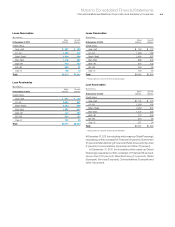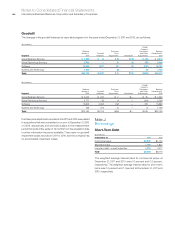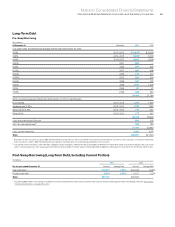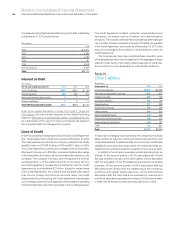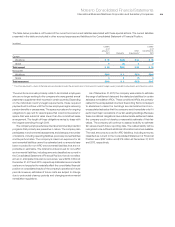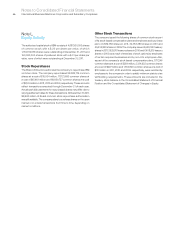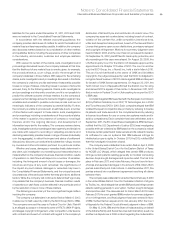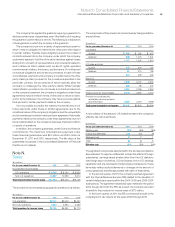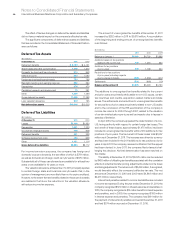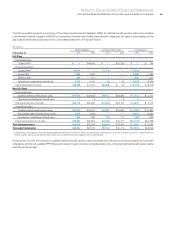IBM 2011 Annual Report Download - page 115
Download and view the complete annual report
Please find page 115 of the 2011 IBM annual report below. You can navigate through the pages in the report by either clicking on the pages listed below, or by using the keyword search tool below to find specific information within the annual report.Notes to Consolidated Financial Statements
International Business Machines Corporation and Subsidiary Companies 113
distribution of AIX and Dynix and contribution of code to Linux. The
company has asserted counterclaims, including breach of contract,
violation of the Lanham Act, unfair competition, intentional torts,
unfair and deceptive trade practices, breach of the General Public
License that governs open source distributions, promissory estoppel
and copyright infringement. Motions for summary judgment were
heard in March 2007, and the court has not yet issued its decision.
On September 14, 2007, plaintiff filed for bankruptcy protection, and
all proceedings in this case were stayed. On August 25, 2009, the
U.S. Bankruptcy Court for the District of Delaware approved the
appointment of a Chapter 11 Trustee of SCO. The court in another
suit, the SCO Group, Inc. v. Novell, Inc., held a trial in March 2010.
The jury found that Novell is the owner of UNIX and UnixWare
copyrights; the judge subsequently ruled that SCO is obligated to
recognize Novell’s waiver of SCO’s claims against IBM and Sequent
for breach of UNIX license agreements. On August 30, 2011, the
Tenth Circuit Court of Appeals affirmed the district court’s ruling
and denied SCO’s appeal of this matter. In November 2011, SCO
filed a motion in Federal Court in Utah seeking to reopen the SCO
v. IBM case.
Complaints against IBM were filed with the European Commission
(EC) by Platform Solutions, Inc. in 2007, T3 Technologies, Inc. in 2009
and TurboHercules SAS in 2010. Each complaint alleged that IBM
violated European Competition law, primarily by refusing to license
its patents and trade secrets to the complainants and by refusing
to license its software for use on computer systems made and/or
sold by complainants. Each complaint has been withdrawn, and in
September 2011, the EC closed these investigations. IBM had been
notified that the U.S. Department of Justice (DOJ) was investigating
possible antitrust violations by IBM based on the company’s refusal
to license certain patents and trade secrets and its refusal to license
its software for use on systems that IBM believes infringe its
intellectual property rights. In October 2011, the DOJ notified IBM
that this investigation has been closed.
The company was a defendant in an action filed on April 2, 2009
in the United States District Court for the Eastern District of Texas
by ACQIS LLC (Acqis), which alleged that certain IBM products
infringe certain patents relating generally to modular computing
devices. Acqis sought damages and injunctive relief. The trial took
place in February 2011, and in late February, the jury found in favor
of Acqis and awarded damages in the amount of $9 million. Both
parties submitted post-trial motions. In late December 2011, the
parties entered into a settlement agreement resolving all claims
between them.
The company was a defendant in an action filed on February 5, 2010
in the United States District Court for the Eastern District of Virginia
by TecSec, Inc., which alleged that certain IBM products infringe certain
patents relating generally to encryption. TecSec sought damages
and injunctive relief. The case was set for trial in March 2011. In late
February 2011, the court granted IBM’s motion for summary judgment
of non-infringement, and final judgment has been entered in favor
of IBM. TecSec filed an appeal, and in mid-January 2012, the Court
of Appeals for the Federal Circuit affirmed judgment in favor of IBM.
On May 13, 2010, IBM and the State of Indiana (acting on behalf
of the Indiana Family and Social Services Administration) sued one
another in a dispute over a 2006 contract regarding the modernization
liabilities for the years ended December 31, 2011, 2010 and 2009
were not material to the Consolidated Financial Statements.
In accordance with the relevant accounting guidance, the
company provides disclosures of matters for which the likelihood of
material loss is at least reasonably possible. In addition, the company
also discloses matters based on its consideration of other matters
and qualitative factors, including the experience of other companies
in the industry, and investor, customer and employee relations
considerations.
With respect to certain of the claims, suits, investigations and
proceedings discussed herein, the company believes at this time
that the likelihood of any material loss is remote, given, for example,
the procedural status, court rulings, and/or the strength of the
company’s defenses in those matters. With respect to the remaining
claims, suits, investigations and proceedings discussed in this Note,
the company is unable to provide estimates of reasonably possible
losses or range of losses, including losses in excess of amounts
accrued, if any, for the following reasons. Claims, suits, investigations
and proceedings are inherently uncertain, and it is not possible to
predict the ultimate outcome of these matters. It is the company’s
experience that damage amounts claimed in litigation against it are
unreliable and unrelated to possible outcomes, and as such are not
meaningful indicators of the company’s potential liability. Further,
the company is unable to provide such an estimate due to a number
of other factors with respect to these claims, suits, investigations
and proceedings, including considerations of the procedural status
of the matter in question, the presence of complex or novel legal
theories, and/or the ongoing discovery and development of
information important to the matters. The company reviews claims,
suits, investigations and proceedings at least quarterly, and decisions
are made with respect to recording or adjusting provisions and
disclosing reasonably possible losses or range of losses (individually
or in the aggregate), to reflect the impact and status of settlement
discussions, discovery, procedural and substantive rulings, reviews
by counsel and other information pertinent to a particular matter.
Whether any losses, damages or remedies finally determined in
any claim, suit, investigation or proceeding could reasonably have a
material effect on the company’s business, financial condition, results
of operations or cash flows will depend on a number of variables,
including: the timing and amount of such losses or damages; the
structure and type of any such remedies; the significance of
the impact any such losses, damages or remedies may have in
the Consolidated Financial Statements; and the unique facts and
circumstances of the particular matter that may give rise to additional
factors. While the company will continue to defend itself vigorously,
it is possible that the company’s business, financial condition, results
of operations or cash flows could be affected in any particular period
by the resolution of one or more of these matters.
The following is a summary of the more significant legal matters
involving the company.
The company is a defendant in an action filed on March 6, 2003
in state court in Salt Lake City, Utah by the SCO Group (SCO v. IBM).
The company removed the case to Federal Court in Utah. Plaintiff
is an alleged successor in interest to some of AT&T’s UNIX IP rights,
and alleges copyright infringement, unfair competition, interference
with contract and breach of contract with regard to the company’s


